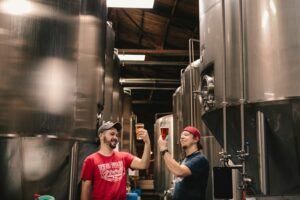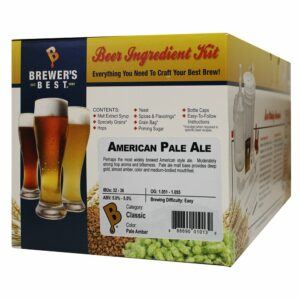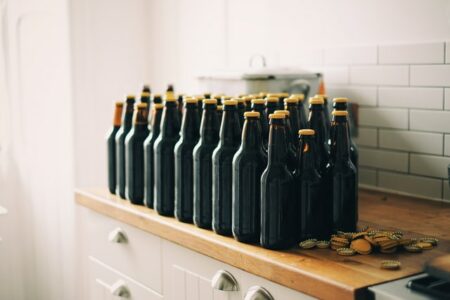Imagine pouring and enjoying a cold beer that you made yourself, that is a pretty cool thought, but it doesn’t have to be just a thought it could easily be a reality. Brewing your own beer goes hand in hand with having your own home bar.
There is no bar needed though, and with plenty of home brewing recipes available it’s easier than you might think to get into home brewing. The equipment needed is also minimal, and you can start with a brewing kit for your first beer to make it easy at the beginning.
As time goes on you can either tweak a brewing kit to make it your own, or make your own recipes from scratch.
Why Brew Your Own Beer
There are a number of reasons why anyone might want to brew their own beer, the obvious one being that it is cheaper than buying commercially produced beer. There is also the freedom of creating the taste and depth of the beer, or the strength according to our own preferences.
Brewing beer is also a great hobby, at the beginning you follow recipes that have been developed, then as experience kicks in things become interesting. Developing your own recipe is exciting, brewing a beer that is unique is an amazing achievement, especially if it tastes great.
Whatever the reason may be, home brewing is fun and if you like to drink beer, then it is worth rolling your sleeves up and diving into your first brew.
Serving your own beer at your own home bar, what could be better.
How To Home Brew
Like any hobby there is an array of equipment and gadgets designed to make what you are doing easier or more accurate. This should not put you off because at the beginning of everything there is always a basic kit that gets you started. Once you know what you are doing and know you enjoy what you are doing, then you can build on your kit.
The basic way to brew at home is to get your equipment and ingredients ready to go to work, you prepare for the brew ahead.
Next you follow the instructions in your home brewing recipe putting the different ingredients together. Just like you would prepare a meal, you are preparing your brew.
Then it is time to transfer your brew to a fermenter, add the last of the ingredients and seal the fermenter and store somewhere cool and dark.
Clean all your equipment, then it is a waiting game, probably the hardest part waiting to try your beer.
The next stage is to bottle your beer, transferring from fermenter to bottling bucket, and then into bottles, the smell, the excitement.
Once bottled you will need to let the beer carbonate which means storing them for a couple of weeks.
Last stage is to chill and enjoy.
The Basic Equipment
- Fermenter
- Brewing Kettle
- Bottling Bucket
- Auto Siphon
- Stirring Spoon
- Sanitizer
- Ingredients
The ingredients is best sourced from a brewing kit, this makes it easy at the beginning. Once you are an experienced brewer you can get the individual ingredients and play around with your own recipes.
As you can see from the short list, there is not a lot of equipment needed to get you started, and just as the recipes can be bought in kit form, so to can the equipment. There are starter kits that will contain the basic equipment mentioned.
A tip for brewing is to make sure you sanitize all your equipment, especially before you use it, keep it all clean.
The Easiest Beer To Brew
 As with anything there is normally different levels of difficulty involved in a process and when it comes to brewing beer there is no difference. Some beers are easier than others to brew, so it is advisable to go for the easy options for your first few brews.
As with anything there is normally different levels of difficulty involved in a process and when it comes to brewing beer there is no difference. Some beers are easier than others to brew, so it is advisable to go for the easy options for your first few brews.
The easiest beers to brew are ales, any type of ale is the most forgiving if you make a slight mistake or error in your brewing. A pale ale, an amber ale, A brown ale or a porter will all be less susceptible to ruin if errors are made whilst making your beer.
If you are just starting out, then stick to ales and get them in form of a recipe kit, don’t try to run before you can walk.
The Hardest Beer To Brew
On the other side of the coin we have those beers you should steer clear of until you have some real brewing experience under your belt. The hardest type of beer to brew is light lagers and pilsners.
Unlike ales, that will let you get away with the odd mistake or two, the light lagers and pilsners will not let you get away with anything. You will need to be precise and organized if you are to attempt these beers.
Start with ales, make several brews until you become consistent, then build your way up slowly until you hit the dizzy heights of a light lager or pilsner.
Home Brew Kits And Recipes
The best option for any beginner is to get a home brew kit, it will contain malted grains, a brew bag, sugar, yeast and dried malt, as well as instructions on how to brew your beer.
Everything you need in one easy kit to get your first brew under way without having to purchase the ingredients separately.
If you prefer to purchase ingredients separately, then the alternative is to get hold of a prepared recipe, this will list the ingredients. The best way to do this is to get a book of home brew recipes, there are a lot to choose from and some contain up to 300 recipes, which will keep you busy for a few years.
Start Home Brewing
So are you tempted to start home brewing?
If you are then great, just remember to start off slowly. You will only need basic equipment and a basic recipe for a robust ale, and then you are set to go.
When you have a few brews under your belt, you can expand on your equipment, try a more difficult recipe and even join The Brewers Association.
The Brewers Association is an organization of brewers for brewers, with members from individuals to trade all passionate about brewing beer.
One day you may become a master brewer, tweaking and playing with brews to perfect them, you may even be creating your own beer recipes. The sky is the limit, but most home brewers will stay just there at home, brewing and enjoying there favorite beers.
If you are already a home brewer, or if you are just about to start, share your story below, especially if you have some home brewing recipes to share. Good luck with your brewing efforts, and enjoy the finished product.
Rob is a passionate home bar and pub shed enthusiast with a passion for craft beer. With hands-on experience in designing and building his own home bar, Rob shares his knowledge, tips, and inspiration to help fellow enthusiasts create their own perfect space. Alongside the world of home bars and pub sheds, Rob also explores the diverse and exciting realm of craft beer, providing honest reviews to help you discover your next favorite brew. Join Rob on a journey of flavor, design, and craftsmanship right here on Home Bar Kit.

